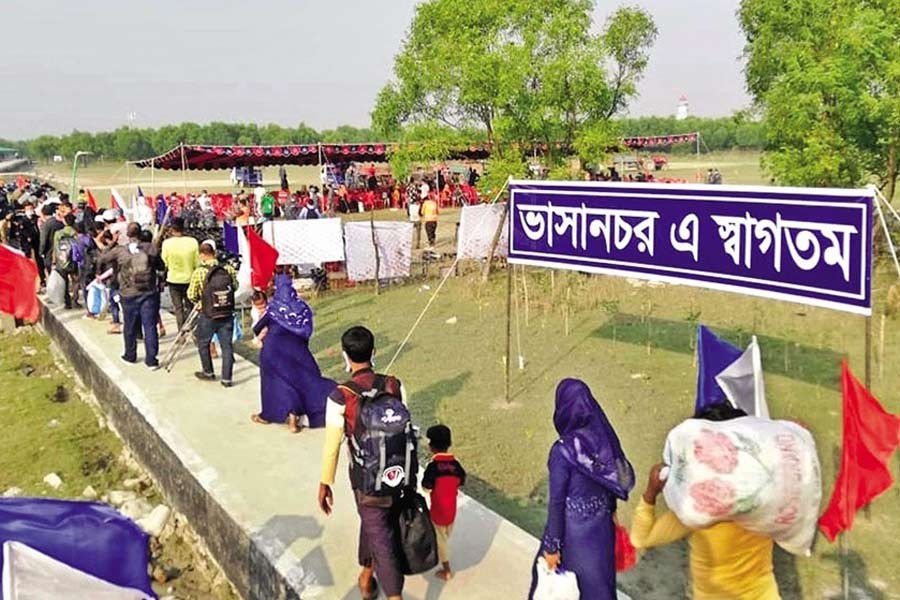A lot of educated people may detect a resemblance between the start of relocation of 100,000 Rohingya refugees to Bhashan Char and a similar episode in ManikBandyopadhyay's novel 'Padma NodirMajhi'. In the novel, the slightly crooked but the utopian Hossain Mia embarks on a project to take poor people from his village to 'MainaDwip'in the Bay of Bengal. Apparently, he has no ulterior motive behind his dream project. In a radically changed world perspective, the realities have turned out to be different with newer dimensions.
In the case of the shifting of Rohingya refugees from the squalid life at the camps in the Cox's Bazar district, until they returned to their homeland in Myanmar's Rakhine, the government had also to cross many hurdles. The task of dealing with the Myanmar refugees itself emerged as a challenge to the country's administration. When the latest Rohingya infiltration began in August 2017, it was the local government authorities in Cox's Bazar which had to shoulder the burden of feeding and sheltering the refugees. With the number of refugees galloping as days went by, Bangladesh found itself in a vulnerable situation.
Apart from the responsibility of looking after the refugees, especially women and children, the government had to seek help of many countries and organisations in asking Myanmar to stop Rohingya persecution. And take its people back. Despite formal requests followed by condemnations pouring in from around the globe, Myanmar appeared to have dug in its heel. Isolated and discordant attempts taken by international organisations, including the UN, and the large NGOs proved insufficient for tackling the massive problem. With the Southeast Asian country continuing its hollow promises of taking its citizens back and the subterfuges, the crisis just kept deteriorating.
In the interregnum, the Myanmar Army wiped out Rohingya villages one after another by burning them to the ground. The dastardly act was prompted by the apprehension of Myanmar being summoned by the International Court of Justice to face charges of 'genocide' during its brutal military crackdown on the Rohingyas in August 2017. The country is also apprehensive of being indicted by International Criminal Court. It has already started investigation into the Myanmar junta's acts of human rights violations let loose on the perennially persecuted Rohingya citizens.
Against this troubling backdrop full of record number of instances of Rohingya persecutions and rights violations, Myanmar has been able to escape international censure. A few regional powers expressed their occasional disapproval of the ethnic war-torn country's Rohingya treatment. But they have yet to bring the still junta-blessed civilian government to the negotiation table to thrash out a way out of the Rohingya deadlock. Prior to the landslide victory of the 'democracy icon' Aung San SuuChi in the general election of 2015, the Rohingyas looked to her in expectation of an oppression-free life. Their hopes were dashed as the popular leader looked the other way when thejunta people and the xenophobic communities were preparing to launch their ethnic cleansing campaigns against the Rohingyas on flimsy pretexts.
Suu Chi was silent on the day when the Myanmar Army, various security forces and armed thugs swooped down on the Rohingya villages. The unabated reign of terror compelled them to cross the international land and river borders into south-eastern Bangladesh. In the early 1990s, hundreds and thousands crossed into Bangladesh to flee persecution. Despite a widely publicised repatriation programme not long after, a lot of displaced Rohingyas stayed back in Bangladesh. At present, with the addition of the new arrivals in 2017, the number of Rohingya refugees in Bangladesh comes to over 1 million.
Bangladesh provided the Rohingyas with shelter on humanitarian grounds. But the universal truth is nowhere in the world prolonged stay of unproductive refugees is welcomed. Clashes with local populations are inevitable. Bangladesh was made a witness to just those grim scenarios. In no time clashes with the refugees began spreading to the Rohingya dominant areas. The refugees were supposed to remain confined to their camp areas. But they managed to come out of their restricted areas with the 'help' of the local syndicates. Apart from wreaking havoc on the greater Cox's Bazar region's ecological balance and biodiversity, a lot of the refugees got involved in drug running. Besides, various other crimes and anti-social activities, then strange to the areas' general people began spreading in the area.
Except the international crime tribunals operating on being pricked by conscience, few global bodies seem to be serious about the snowballing Rohingya crisis. The UN remained active in the early period of the crisis. Apart from observing the overall situation, they were relentless in recording the developments unfolding in the troubled scenario. Their fact finding missions had helped the world have glimpses of what Myanmar had in mind for the near future. Lately, the UN seems to be more involved in refugee crises elsewhere in the world.
The Bangladesh Government had little options to temporarily relocating 100,000 Rohingya refugees to the Bhashan Char Island off the Bangladesh coast. The population is a tiny fraction of the total 1 million Rohingya refugees. As has been learnt, the government has no intention to turn the 13,000-acre island complete with all necessary facilities into a permanent Rohingya habitat.
The Bangladesh authorities will continue to stress the repatriation of the refugees to their land. The onus of creating a favourable atmosphere lies on the Myanmar government. Despite Myamar's signing of MoUs with UNDP and UN Refugee Agency for creating conditions conducive to repatriation, Rohingyas are averse toreturning to their land. After the failure of two attempts at repatriation in the last three years, Rohingyas have observed that there are no guarantees of citizenship, safety and basic rights for them in Myanmar's Rakhine state. The harsh truth is Bangladesh can ill afford to create more refugee islands under the ominous shadow of a global pandemic. It's Myanmar which must act now.


